Letters from Arthur Seaforth Blackburn to his family, 1941 - Part 11
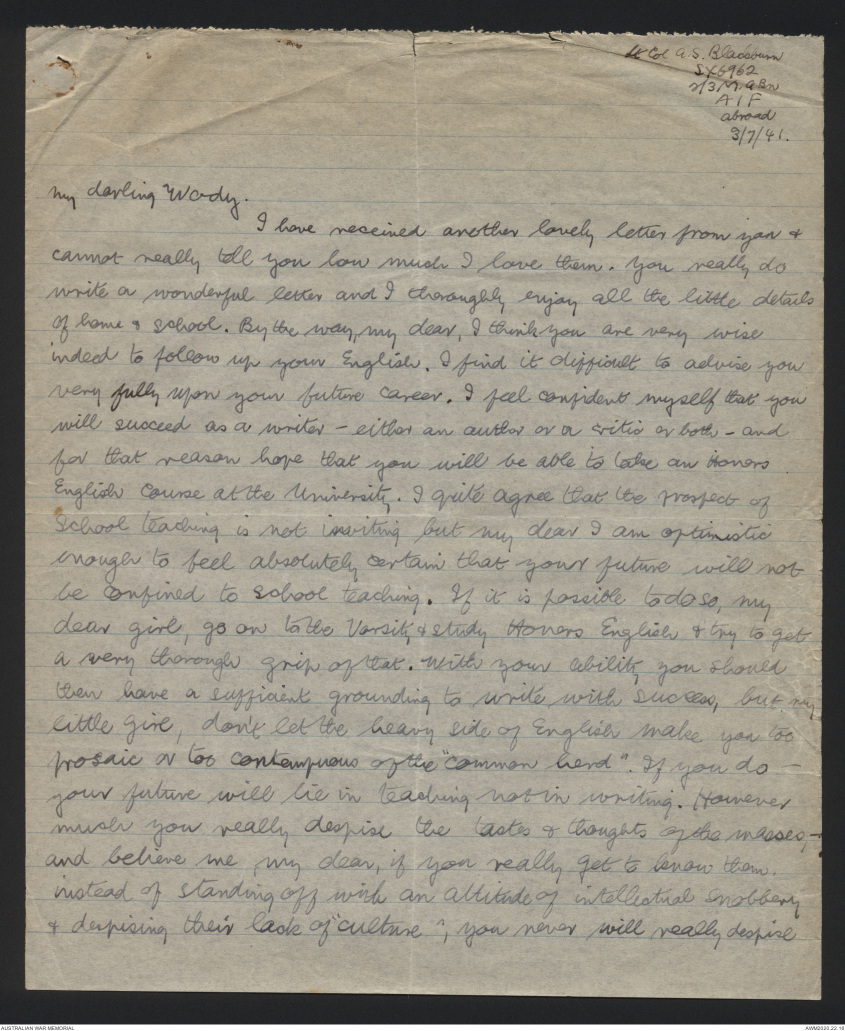
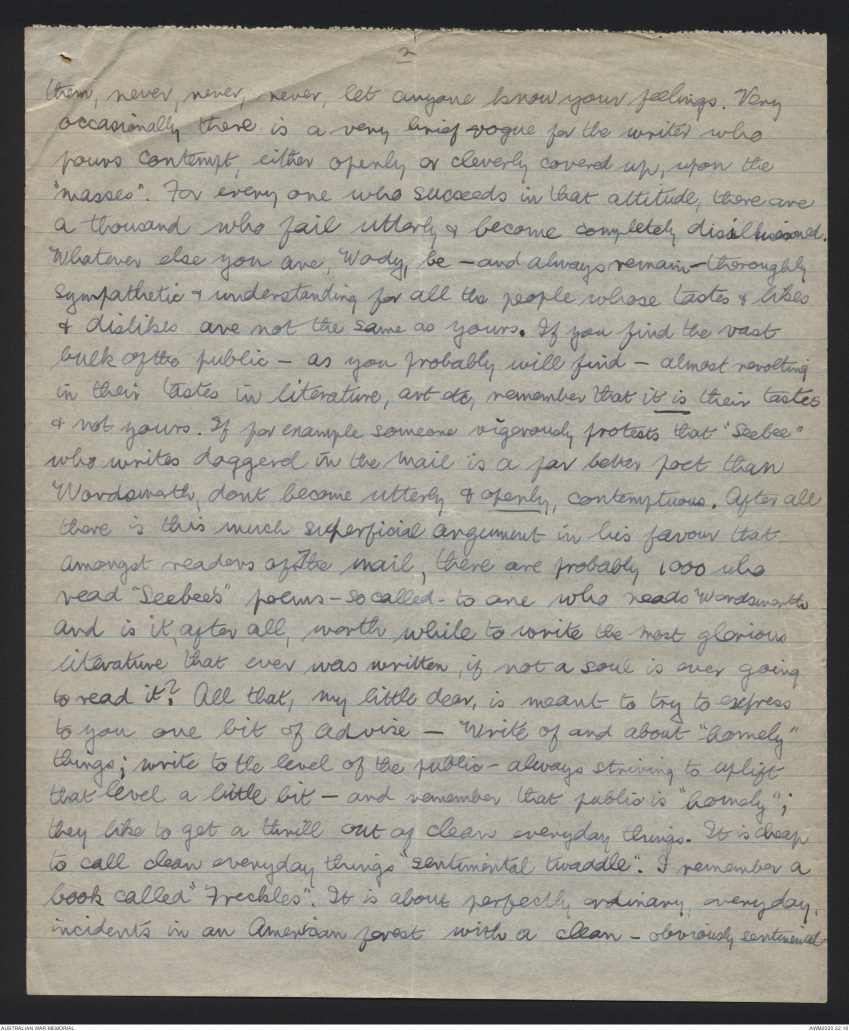
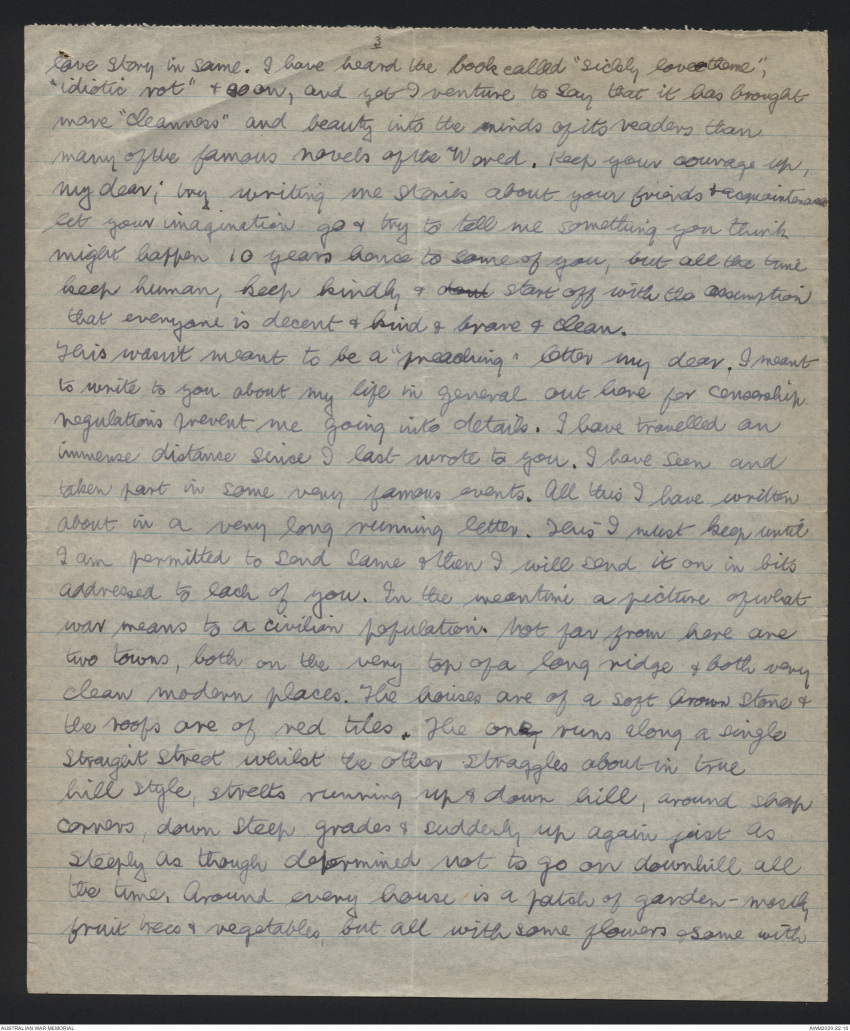
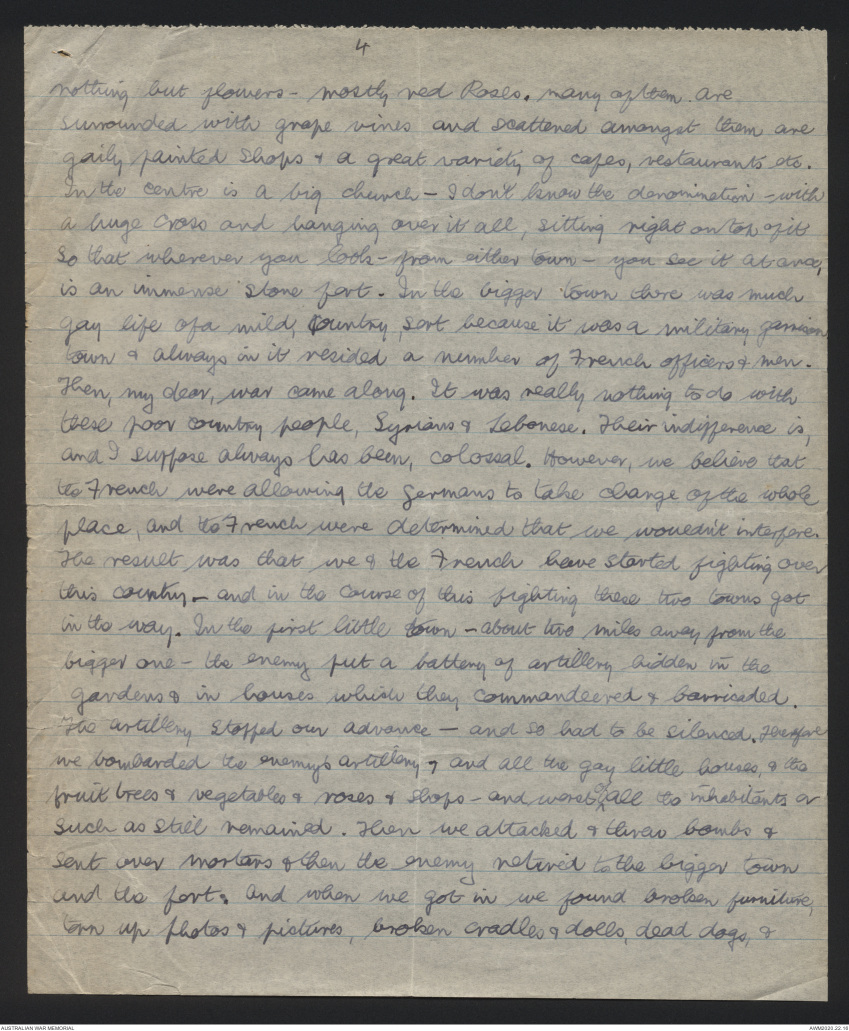
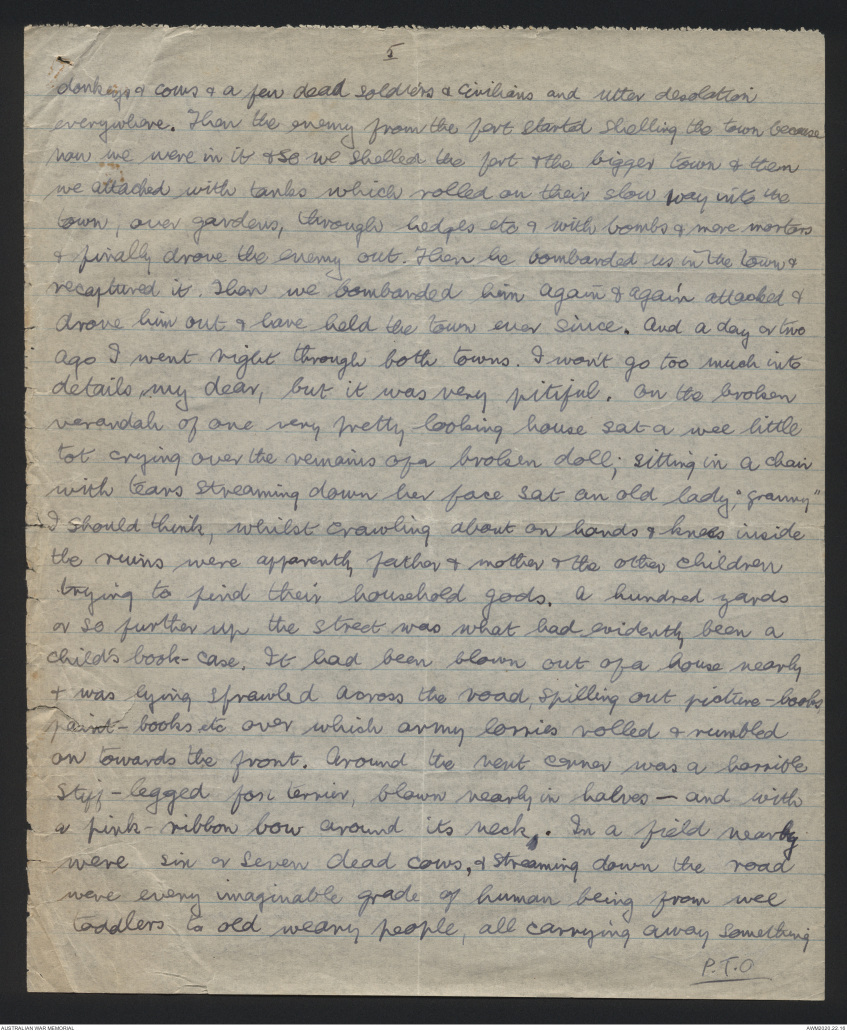
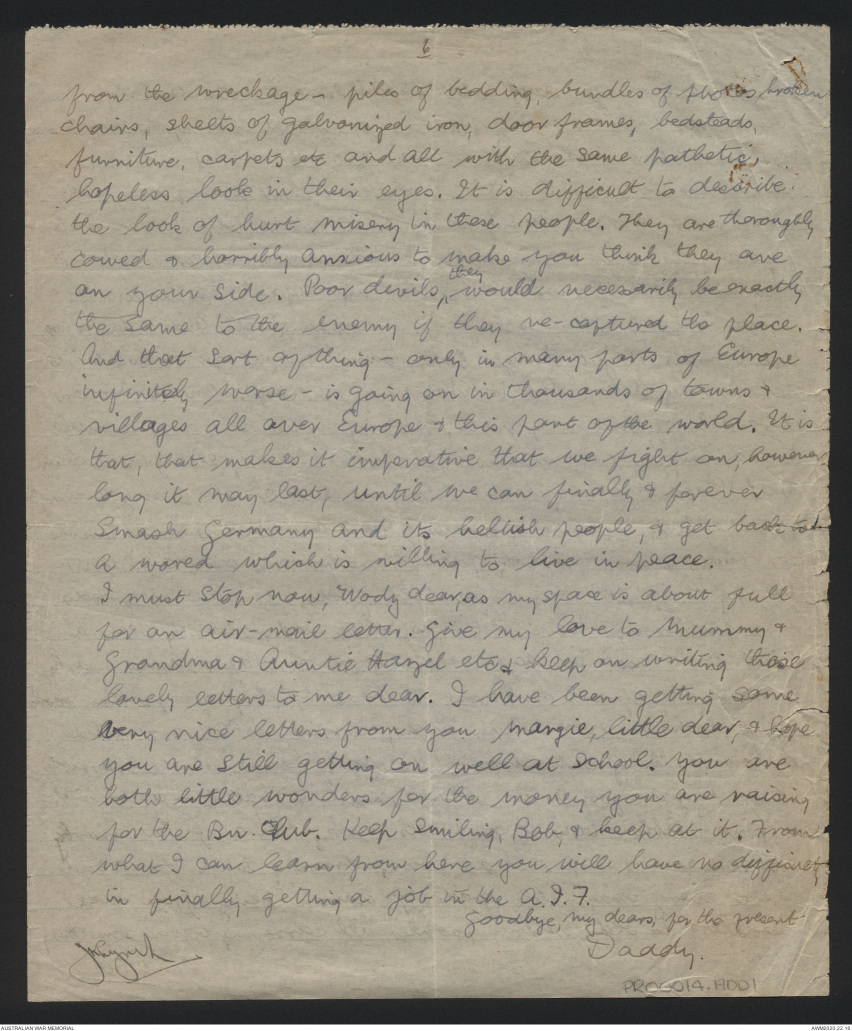
Lt Col A.S. Blackburn
SX6962
2/3 M.G Bn
AIF
abroad
3/7/41.
My darling Wody.
I have received another lovely letter from you &
cannot really tell you how much I love them. You really do
write a wonderful letter and I thoroughly enjoy all the little details
of home & school. By the way, my dear, I think you are very wise
indeed to follow up your English. I find it difficult to advise you
very fully upon your future career. I feel confident myself that you
will succeed as a writer - either an author or a critic or both - and
for that reason hope that you will be able to take an Honors
English course at the University. I quite agree that the prospect of
School teaching is not inviting but my dear I am optimistic
enough to feel absolutely certain that your future will not
be confined to school teaching. If it is possible to do so, my
dear girl, go on to the Varsity & study Honors English & try to get
a very thorough grip of that. With your ability you should
then have a sufficient grounding to write with success, but my
little girl, don't let the heavy side of English make you too
prosaic or too contemptuous of the "common herd". If you do -
your future will lie in teaching not in writing. However
much you really despise the tastes & thoughts of the masses, -
and believe me my dear, if you really get to know them,
instead of standing off with an attitude of intellectual snobbery
& despising their lack of "culture", you never will really despise
2/
them, never, never, never, let anyone know your feelings. Very
occasionally there is a very brief vogue for the writer who
pours contempt, either openly or cleverly covered up, upon the
"masses". For every one who succeeds in that attitude, there are
a thousand who fail utterly & become completely disillusioned.
Whatever else you are, Wody, be - and always remain - thoroughly
sympathetic & understanding for all the people whose tastes & likes
& dislikes are not the same as yours. If you find the vast
bulk of the public - as you probably will find - almost revolting
in their tastes in literature, art etc, remember that it is their tastes
& not yours. If for example someone vigorously protests that "Seebee"
who writes doggerel in the Mail is a far better poet than
Wordsworth, don't became utterly & openly, contemptuous. After all
there is this much superficial argument in his favour that
amongst readers of the Mail, there are probably 1000 who
read "Seebee's" poems - so called - to one who reads Wordsworths
and is it, after all, worth while to write the most glorious
literature that ever was written, if not a soul is ever going
to read it? All that, my little dear, is meant to try to express
to you one bit of advise - write of and about "homely"
things; write to the level of the public - always striving to uplift
that level a little bit - and remember that public is "homely";
they like to get a thrill out of clean everyday things. It is cheap
to call clean everyday things "sentimental twaddle". I remember a
book called "Freckles". It is about perfectly ordinary, everyday,
incidents in an American forest with a clean - obviously sentimental
3/
love story in same. I have heard the book called "sickly love-theme",
"idiotic rot" & so on, and yet I venture to say that it has brought
more "cleanness" and beauty into the minds of its readers than
many of the famous novels of the World. Keep your courage up,
my dear; try writing me stories about your friends & acquaintances
let your imagination go & try to tell me something you think
might happen 10 years hence to some of you, but all the time
keep human, keep kindly & dont start off with the assumption
that everyone is decent & kind & brave & clean.
This wasn't meant to be a "preaching" letter my dear. I meant
to write to you about my life in general out here for censorship
regulations prevent me going into details. I have travelled an
immense distance since I last wrote to you. I have seen and
taken part in some very famous events. All this I have written
about in a very long running letter. This I must keep until
I am permitted to send same & then I will send it on in bits
addressed to each of you. In the meantime a picture of what
war means to a civilian population. Not far from here are
two towns, both on the very top of a long ridge & both very
clean modern places. The houses are of a soft brown stone &
the roofs are of red tiles. The one runs along a single
straight street whilst the other straggles about in true
hill style, streets running up & down hill, around sharp
corners, down steep grades & suddenly up again just as
steeply as though determined not to go on downhill all
the time. Around every house is a patch of garden - mostly
fruit trees & vegetables, but all with some flowers & some with
4
nothing but flowers - mostly red Roses, many of them are
surrounded with grape vines and scattered amongst them are
gaily painted shops & a great variety of cafes, restaurants etc.
In the centre is a big church - I don't know the denomination - with
a huge cross and hanging over it all, sitting right on top of it
So that wherever you look - from either town - you see it at once,
is an immense stone fort. In the bigger town there was much
gay life of a mild, country, sort because it was a military garrison
town & always in it resided a number of French officers & men.
Then, my dear, war came along. It was really nothing to do with
these poor country people, Syrians & Lebanese. Their indifference is,
and I suppose always has been, colossal. However, we believe that
the French were allowing the Germans to take charge of the whole
place, and the French were determined that we wouldn't interfere.
The result was that we & the French have started fighting over
this country - and in the course of this fighting these two towns got
in the way. In the first little town - about two miles away from the
bigger one - the enemy put a battery of artillery hidden in the
gardens & in houses which they commandeered & barricaded.
The artillery stopped our advance - and so had to be silenced. Therefore
we bombarded the enemy's artillery & and all the gay little houses, & the
fruit trees & vegetables & roses & shops - and worst of all its inhabitants or
such as still remained. Then we attacked & threw bombs &
sent over mortars & then the enemy retired to the bigger town
and the fort: and when we got in we found broken furniture,
torn up photos & pictures, broken cradles & dolls, dead dogs, &
5/
donkeys & cows & a few dead soldiers & civilians and utter desolation
everywhere. Then the enemy from the fort started shelling the town because
now we were in it & so we shelled the fort & the bigger town & then
we attacked with tanks which rolled on their slow way into the
town, over gardens, through hedges etc & with bombs & more mortars
& finally drove the enemy out. Then he bombarded us in the town &
recaptured it. Then we bombarded him again & again attacked &
drove him out & have held the town ever since. And a day or two
ago I went right through both towns. I won't go too much into
details my dear, but it was very pitiful. On the broken
verandah of one very pretty looking house sat a wee little
tot crying over the remains of a broken doll; sitting in a chair
with tears streaming down her face sat an old lady, "granny"
I should think, whilst crawling about on hands & knees inside
the ruins were apparently father & mother & the other children
trying to find their household goods. A hundred yards
or so further up the street was what had evidently been a
child's book-case. It had been blown out of a house nearby
& was lying sprawled across the road, spilling out picture-books
paint-books etc over which army lorries rolled & rumbled
on towards the front. Around the next corner was a horrible
stiff-legged fox terrier, blown nearly in halves - and with
a pink-ribbon bow around its neck,. In a field nearby
were six or seven dead cows, & streaming down the road
were every imaginable grade of human being from wee
toddlers to old weary people, all carrying away something
P.T.O
6/
from the wreckage - piles of bedding, bundles of photos, broken
chairs, sheets of galvanized iron, door frames, bedsteads,
furniture, carpets etc and all with the same pathetic
hopeless look in their eyes. It is difficult to describe
the look of hurt misery in these people. They are thoroughly
cowed & horribly anxious to make you think they are
on your side. Poor devils they would necessarily be exactly
the same to the enemy if they re-captured the place.
And that sort of thing - only in many parts of Europe
infinitely worse - is going on in thousands of towns &
villages all over Europe & this part of the world. It is
that, that makes it imperative that we fight on, however
long it may last, until we can finally & forever
Smash Germany and its hellish people, & get back to
a world which is willing to live in peace.
I must stop now, Wody dear, as my space is about full
for an air-mail letter. Give my love to Mummy &
Grandma & Auntie Hazel etc & keep on writing those
lovely letters to me dear. I have been getting some
very nice letters from you Margie, little dear, & hope
you are still getting on well at school. You are
both little wonders for the money you are raising
for the Bn. Club. Keep Smiling, Bob & keep at it. From
what I can learn from here you will have no difficulty
in finally getting a job in the A.I.F.
Goodbye, my dears, for the present
Daddy.
JKLynch
 Jacqueline Kennedy
Jacqueline KennedyThis transcription item is now locked to you for editing. To release the lock either Save your changes or Cancel.
This lock will be automatically released after 60 minutes of inactivity.